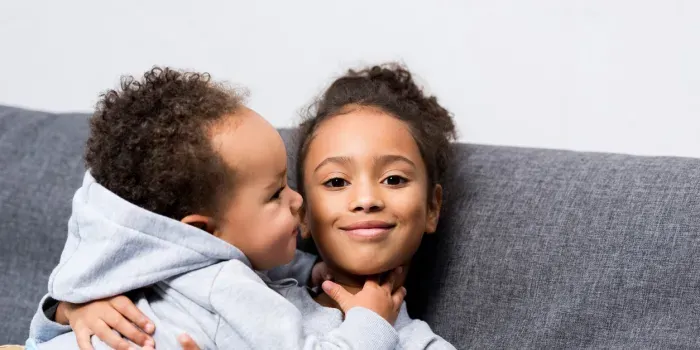A child with a chronic illness, such as a bleeding disorder, needs a lot of special care and attention from his or her parents. That can leave unaffected siblings feeling neglected, angry or sad.
Brothers and sisters may feel jealous that their sibling with a bleeding disorder seems to get most of the attention.
Emily Incledon, MD, a clinical psychologist at the Rehabilitation Service of the Royal Children’s Hospital in Melbourne, Australia, was the lead author of a 2013 review of mental health issues in siblings of children with chronic diseases.
“Family life starts to revolve around the needs of the other child,” Incledon told The New York Times in 2018. Thus siblings may withdraw or act out in response.
Helene Zereik, a mother of three in Montreal, has some firsthand experience in juggling sibling needs. Her oldest son, Gabriel, 11, has severe hemophilia B. Her other two children—son Robert, 9, and daughter Naomi, 7—do not.
“It’s a struggle for parents who have kids who have needs because you put so much effort in, but you don’t want the other two to suffer,” she says. “So it’s almost like you have to work in overdrive to make sure that the other children’s needs are met without spoiling any of them.”
Below are some tips from experts and Zereik to help parents meet the needs of siblings of children with bleeding disorders.
Communicate
Talking to kids is key. Let them know it’s OK to feel angry or resentful sometimes about the way their sibling’s bleeding disorder affects their life and the family. Help them express how they feel and validate those feelings. In a study published in ISRN Family Medicine, researchers found that siblings of chronically ill children who perceived their abilities to communicate with parents and adult caregivers as poor were more likely to report social detachment, problems with relationships and alcohol abuse.
Zereik says she talks to her younger children about Gabriel’s bleeding disorder and about how they’re feeling about it, and she makes sure they know she’s available to listen if they want to talk more.
Educate
Help siblings learn about the bleeding disorder. It’s important for kids to understand what’s happening. Share age-appropriate information. “If information is being kept from them, they may become more worried, using their imagination to create scenarios,” Incledon told the Times.
Zereik says explaining Gabriel’s bleeding disorder has helped all of her kids cope.
“Awareness creates acceptance,” she says. “The more you talk about it, the more that it becomes OK. Even for my older son, it doesn’t feel like he has something that’s wrong with him or something that’s different. It’s just part of the process.”
Include
If you can, involve brothers and sisters in the treatment process. Siblings can help—and feel important and included—by doing simple things such as organizing supplies or holding an ice pack. Older kids can help mix factor. Including siblings in doctor appointments and hospital visits can also help demystify the bleeding disorder.
Zereik says when Gabriel has a regular doctor’s appointment at the hospital and he’s not hurt and in pain, the family will make a day of it. “I’ll take them to breakfast first and then we’ll all go together, so that they’re part of the process.”
Zereik also makes sure Robert and Naomi share any benefits of Gabriel’s treatment.
“If Gabriel got a chocolate because he did well, all three of them would get a chocolate,” she says. The same went for little toys or cool bandages.
Make time for everyone
Ensure there’s one-on-one time for each child, where your focus is solely on them. It’s important to make time when the bleeding disorder is not the center of attention. Doing an activity together where talking is not the focus may make it easier for kids to open up and share what’s on their minds.
“You want to divide yourself equally for your children. But the reality is you can’t,” Zereik says. “My older son has more needs than my younger one.”
As a stay-at-home mom, Zereik says it’s hard to carve out big chunks of one-on-one time. Instead she says the family does a lot of things as a unit, including reading together every night. “I always tell my kids we’re a team. I never want them to feel left out.”
Find resources
Look for a hemophilia summer camp that includes siblings along with children who have bleeding disorders. This way, brothers and sisters can meet other siblings who have similar experiences as them. Learn more about the positive effects of going to summer camp at NHF’s Steps for Living. To locate a camp near you, check out NHF’s Camp Directory.
Zereik also recommends the book, It’s Always About Nate, which explores siblings’ feelings about hemophilia. The book is available free from Diplomat Specialty Infusion Group.

